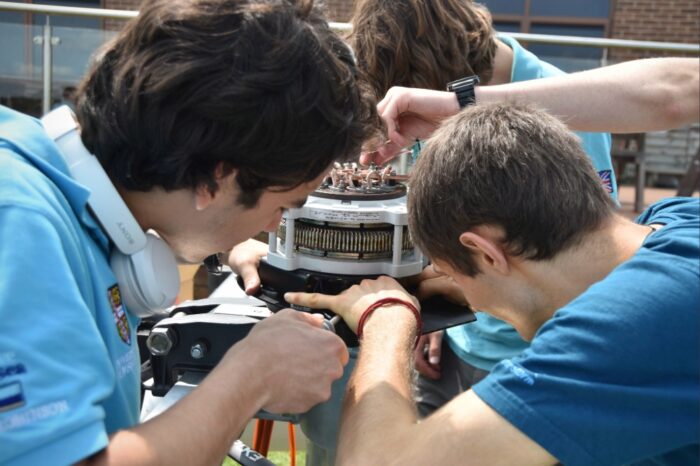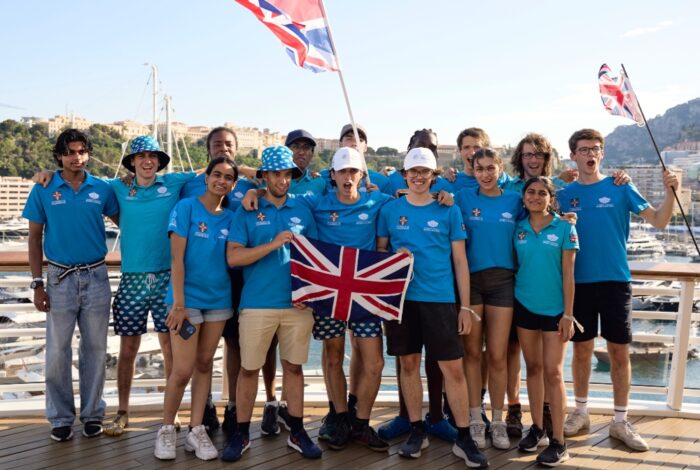Ever heard that electricity and water don’t mix? Our students at Riviera Racing say otherwise.
Changing the tide
Posted:
22 Oct 2025
Trinity Hall students, Tyr Hogsander (Land Economy, 2023), Matteo Cascini (Engineering, 2023), Yonatan Merkier (Engineering, 2023), Joseph Franks (Engineering, 2023) and Nehansa Siriwardena (Medicine, 2024), are members of Riviera Racing, a team at the University of Cambridge who recently built a one-of-a-kind catamaran and competed in the 2025 Monaco Energy Boat Challenge this past July. With their racing vessel ‘Aurora’, they placed 10th out of 20 university teams in the Energy Boat class and demonstrated how their cutting-edge, zero emission technology could be the future of the maritime industry. Tyr and Matteo told us more about their formative journey to the race and where they hope to go next.
The Riviera Racing team is a completely student-led co-operative with around 35 dedicated members from across the University of Cambridge. Studying everything from engineering to clinical medicine, these determined students first dipped their toes into the Monaco Energy Boat Challenge last year, entering a hydrogen-fuelled boat called the ‘Meridian’. This year, they stripped the vessel back to basics, swapping hydrogen cells for battery-power, creating a boat focused entirely on endurance and a more consistent nautical performance.
Their catamaran ‘Aurora’, is almost entirely custom-built. The best part? It is completely emissions-free. The catamaran racer has a novel single engine outboard, a 9kwh custom battery built with prismatic LFP blade cells, a unique propellor and steering system, and is all encompassed in a one-of-akind military grade case that allows for greater longevity and flexibility in the water.

Body and Structures Lead Engineer, Matteo Cascini said:
“Working on such a unique and ambitious project has been incredibly rewarding. Each part of the boat has been carefully designed for performance, and it’s been invaluable to apply our knowledge in a truly hands-on environment.”
While for Riviera’s engineers, this project was a chance to put their engineering studies into practice, for students such as Deputy Director of Operations and Treasurer Tyr, it was an opportunity to be a part of a community taking on something bigger and creating something tangible.
“The students who founded Riviera are some of the most driven and ambitious engineers and businesspeople I’ve ever met. The project being completely student-led is important to us because it’s a demonstration of what can be achieved when we work out problems together.”
The Riviera Racing project has been generously backed and supported by Trinity Hall through the Lee-Yung Family Fund for Entrepreneurship and the 2025 Trinity Hall Catalysts programme, with both Tyr and Director of Operations Harsh Sinha taking part in the initiative. Tyr said, “Getting it from CAD to the water has been all about speaking to people who have done this for decades. We must say a huge thanks to Professor Tony Purnell, Trinity Hall Honorary Fellow and Founder of Pi Research, for helping the Lead Engineer Matteo and the Body and Structures team with his industry expertise. We are incredibly grateful for the support from our partners who have made this project possible.”

Going into the challenge, the team’s aim was to be consistent and reliable, performing well in all three of the energy classes’ races that tested the boat’s speed, endurance and manoeuvrability. They certainly achieved their mission, finishing in 10th place overall in the Energy Class category out of 20 university teams from across the globe.
After their performance, the Riviera Racing team said, “It was an outstanding learning experience for us. Finishing 10th out of the 20 boats in our class, we dramatically improved on last year’s result and set a precedent for the future success of the team. We leave with a deeper understanding of our system, new collaborators, and a clear vision for what’s next.”
Their result on the water is just as inspiring as the future impact their tech could have on an evolving yacht industry. Sustainable yachting has become more and more popular with rising environmental awareness and Riviera Racing is confident that they can persuade the industry to continue to reduce its carbon footprint and look towards more sustainable alternative propulsion systems. Tyr said:
“This [boat] is not just a proof of concept but a genuine working machine. We’re now able to confidently say that this tech can be (and in some cases, already is) used on real, commercial boats. And we’re just students, think of where else it could go!”
The team has high ambitions for the future and as team members graduate, they hope to continue to innovate and raise the bar, focusing on developing even more innovative technologies for the boat such as foiling, computer vision and hydrogen power.
Honorary Fellow Professor Tony Purnell said:
“The team’s energy is infectious and their passion clear. It’s inspiring to see students thriving in their chosen field, and Riveria Racing embodies everything a university society should be.”
With the team’s sights firmly set on re-entering the Monaco Energy Boat Challenge next year, as well as competing in the Sardinia Innovative Boat Week in October, look out for their sails (or lack thereof) on the horizon.
Feature image: © YCM/ Studio Borlenghi